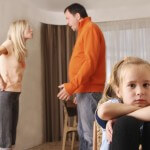Fighting around the children does more damage to them than divorce itself. That’s why as parents we need to be diligent in monitoring our children as well as our own behavior to safeguard our kids from emotional and psychological damage.
A study published in the Journal of Research on Adolescence* shows that children exposed to constant parental bickering are more likely to be depressed. They are also more prone to expressing other “problem behaviors,” including substance abuse, aggression and poor school grades.
Here are some essential behaviors to avoid during and after divorce to protect your children from the negative effects of conflict on their psyches.
Never battle where kids can see or hear you. Little ears can pick up phone conversations as well as conflict behind closed bedroom doors. Parents often don’t think about the psychological impact of their arguments on children. It changes who they are and how they feel about themselves and life in general.
Never lie or play one parent off the other to win your child’s favors. Telling lies about, bashing or demeaning your former spouse confuses, hurts and angers children in serious ways. Keep personal resentments personal and don’t use your kids as sounding boards. They’ll resent you for it and pay the price in stress, anxiety, depression and/or aggression. As they age, they’re also more likely to resent you … and many adult children of divorce disassociate with their parents when they learn truths about how the divorce was handled. You may “win” in the short-term, but your children will hold you accountable in the decades to come. Take the high road and remember, your children love both parents and don’t want to be forced to take sides.
Never let your children feel unimportant to you. Too many divorced parents ignore their children during custodial visits or hand them off to other caregivers so they can work, have free time or catch up on chores. Children need to share attentive time with parents. When they don’t, it creates conflict and anxiety. When you’re with your children remind them of how much you love them and give them your time. When you can’t, explain the circumstances and make plans for when you can. Then be fully there so they feel valued and valuable!
Married or divorced, the results of parental conflict or inattention are the same: children wounded on a deep emotional level that can scar them for life. Children only get one childhood. Don’t they deserve the very best you can provide for them – your love, your attention and the security of your presence? Be the person you want them to model themselves after. You’ll never regret it – nor will they!
Learn more about effective co-parenting skills in audio format or quick-read format —
both from Rosalind Sedacca.
(*January, 2012: Journal of Research on Adolescence)
Rosalind Sedacca, CCT, is a Divorce & Parenting Coach and author of, How Do I Tell the Kids about the Divorce? A Create-a-Storybook Guide to Preparing Your Children — with Love! For her free ebook on Post-Divorce Parenting, her free articles, coaching services and other valuable resources for parents, visit //www.childcentereddivorce.com.






Would you have any interest in submitting an article for our online journal? Please check our publishing stadard on our webside. Thanks. I’m looking forward to hearing from you.. Peter
Many thanks for this invitation to provide an article for your Journal. I will be getting back in touch with you.